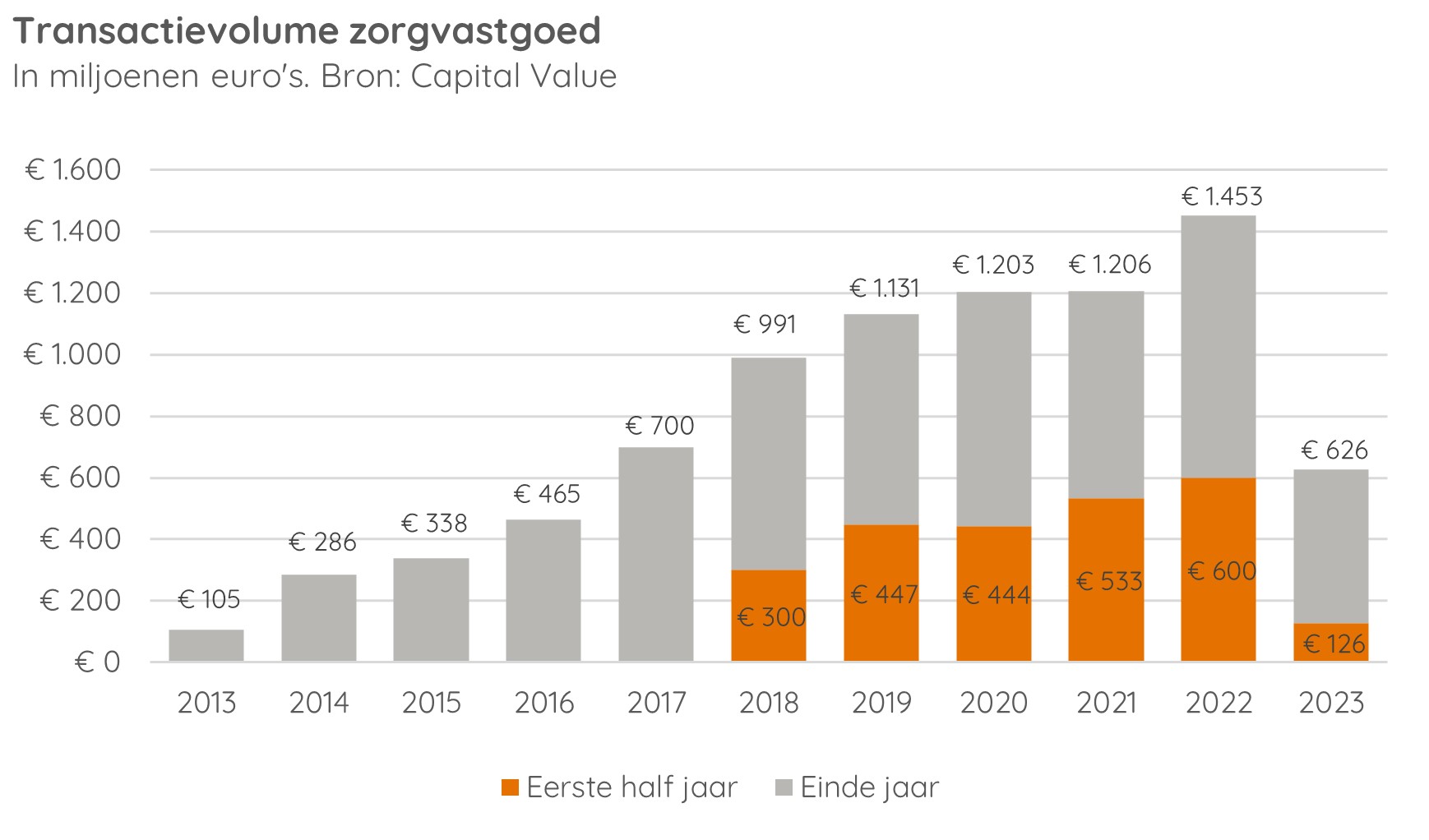Transaction Volume in Healthcare Real Estate Market Halved, New Construction Ambitions Under Pressure
8 januari 2024
In 2023, the number of transactions in the healthcare real estate market saw a significant decline. The transaction volume amounted to 626 million euros, marking a 57% decrease compared to 2022. This decline is mainly attributed to the increased capital market interest rates and investor caution. New construction of healthcare residences accounted for a significant share of the transaction volume at 68%. In 2023, 428 million euros were invested in new construction, equivalent to 1,700 units, representing a decline of over 31% compared to previous years. This figure falls considerably short of meeting the national ambitions for the construction of elderly housing. Consequently, the pressure on this segment continues to intensify. Despite the decrease in transaction volume in healthcare real estate, investors demonstrate optimism for this segment in the coming years. The willingness to invest remains high, with available capital of approximately 4.5 billion euros between 2024 and 2026, as indicated by Capital Value's annual research.

Recovery in the second half of 2023
After a challenging first half-year, the healthcare real estate market recovered in the second half of 2023. The transaction volume increased from 126 million in the first half-year to 500 million during the second half-year. This makes the second half of 2023 comparable to previous years, indicating a recovering market. In 2023, the majority of investments were made in private residential care, followed by extramural healthcare residences. The transaction volume was mainly driven by purchases from Dutch institutional investors. Notably, foreign investors were absent from the Dutch healthcare real estate market in 2023, where they usually account for approximately 350 million euros in transactions annually.
Key role for institutional investors
Institutional investors were responsible for 380 million of the total transaction volume, representing 61%. They took on 85% of the total number of investments in new construction, playing an essential role in realizing new healthcare residences. One significant transaction was the acquisition by the Amvest Living & Care Fund of 22 newly-built private residential care complexes spread across the Netherlands, comprising approximately 480 affordable healthcare residences. These complexes will be operated long-term by the healthcare institution 'Dagelijks Leven', a nationwide operator in dementia care. The Bouwinvest Healthcare Fund acquired, among other properties, two private residential care complexes for the operator Stepping Stones and obtained 98 newly-built adaptable houses in Pijnacker. Housing corporations invested 72 million in healthcare real estate, a 37% decrease compared to the previous year. An example is the purchase of a multifunctional residential care complex in Leiderdorp, acquired by Woonzorg Nederland through an exchange transaction with Rijnhart Wonen.
Insufficient new construction plans for elderly housing
The availability of sufficient healthcare housing remains a critical issue. To address the rapidly increasing and changing demand for elderly housing, the "Wonen en Zorg voor Ouderen" program was presented at the end of 2022 as part of the National Housing and Construction Agenda. Manon Kuipers, Director of Healthcare Real Estate at Capital Value, states, "To meet the growing demand, the government aims to add over 35,000 elderly residences annually to the housing stock until 2030. Looking back at 2023, the first year following the formulated ambition, 428 million euros were invested in newly built residential care complexes. In total, this accounts for the realization of 1,700 units, barely 5% of the national ambition." The expectation is that the ambitious goal for elderly housing in the coming years may not be achieved. Capital Value's research indicates that only 2% to 4% of developers have included healthcare real estate and senior housing in their planning for the coming years.
Lack of regulation and shortage of healthcare professionals affect new construction
To fulfill the government's objectives and create more elderly residences, regulation from local authorities is needed. An example is the "Strengthening control over public housing" bill, which aims to obligate municipalities to include a residential care vision in their housing programs from 2026 onwards. The "Incentive Scheme for Healthcare-Adapted Houses" providing subsidies for the construction and transformation of healthcare residences, is currently limited to social housing and accessible only to housing corporations and healthcare institutions. With a broader scope of this regulation, market participants can also be encouraged to build more healthcare residences. Another challenge is the increasing shortage of healthcare professionals. Capital Value's annual research shows that approximately 20% of healthcare real estate investors face issues in new construction plans for healthcare locations due to significant staffing shortages in this sector. The stance of the new government regarding these challenges will be decisive in addressing the shortages.
Investor willingness to invest remains high
The substantial available capital of 4.5 billion euros confirms that confidence in the healthcare real estate market remains high, partly due to the strong fundamentals in this investment category. Moreover, more institutional investors are prioritizing investments from impact funds due to their positive societal effects. This is a significant development, as it is expected to lead to more investments in regions with average lower livability for the benefit of vulnerable target groups. By fostering collaborations between local social and market parties, concrete plans can be developed to meet the specific demand for healthcare housing.


